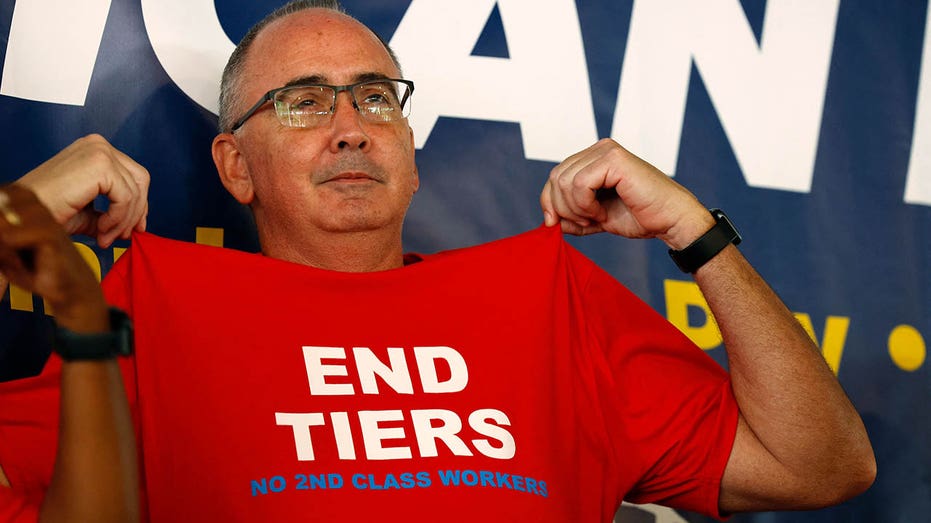As UAW strike nears settlement, let's hope this one demand isn't met
Incentives and competition fuel productivity and growth, while mandated equality leads to stagnation
President Biden stands with UAW strikers: 'Stick with it'
President Joe Biden joined United Auto Workers in Michigan on the 12th day of their strike against major carmakers.
The United Auto Workers (UAW) have reportedly struck agreements with each of the Big Three auto manufacturers, hopefully bringing thousands back to work and restarting U.S. automobile production.
With details still being finalized, it remains to be seen how damaging these agreements will be to the U.S. But if the UAW is happy with the terms, it’s likely that they could have detrimental impacts on the U.S. economy and workforce for generations.
It’s easy to understand why. The UAW has made demands that could damage the competitiveness of U.S. auto manufacturers. They’ve asked for significant wage increases and a shorter work week, making it tough for U.S. manufacturers to compete globally and potentially weakening a core and beloved American industry.

UAW members and supporters on a picket line outside the Stellantis NV Toledo Assembly Complex in Toldeo, Ohio, on Sept. 22, 2023. (Emily Elconin/Bloomberg via / Getty Images)
However, it's the UAW's third demand that is most troubling: the elimination of the two-tiered wage system, which would result in everyone in a given role receiving the same compensation, regardless of their experience or time in their position. This demand is fundamentally un-American and would have severe unintended consequences.
UNITED AUTO WORKERS STRIKE: COST TO US ECONOMY SETS NEW RECORD
Recently, UPS eliminated their two-tiered wage system. If the UAW secures this concession, the auto industry would be the next domino to fall, putting American industry on the perilous path of self-imposed decline.Negotiators need look no further than Communist Mao Zedong’s China in the 1950s and 1960s to see the disastrous economic effects of this policy. Unsurprisingly, Marxists are advising the UAW leadership and pushing for a similar wage system.
Mao's vision of socialist equality, with uniform wages irrespective of occupation, education or skill level, led to disastrous economic effects and human suffering.
UAW president Shawn Fain has been 'nothing but surprising' throughout process: Jamie Butters
Automotive News executive editor Jamie Butters discusses the expansion of the UAW strikes and its impact on car buyers.
When everyone is paid the same regardless of their performance or skills, the motivation to excel dissipates.
Egalitarian wage policies also resulted in resource misallocation. Wages failed to reflect the actual demand for different types of labor, leading to shortages in some sectors and surpluses in others. Additionally, the rigid wage structure failed to account for varying living costs across regions, distorting labor mobility.
Mao’s egalitarian wage system and other command economic policies led to famine, starvation and the crippling of China’s economy.
Impact from UAW strike 'is quite a ripple effect' on dealerships: Jordan Baker
Comodo Motors general manager Jordan Baker joins 'The Big Money Show' to discuss the impact on auto dealers and car buyers from the ongoing UAW strike.
CLICK HERE TO READ MORE ON FOX BUSINESS
China’s subsequent leader Deng Xiaoping viewed economics differently. He introduced market reforms, a stark departure from Mao’s egalitarian model.
Deng focused on fostering competition. His emphasis on incentivizing hard work and innovation through market-based wages, competition and productivity rewards played a pivotal role in China’s transformation. It spurred increased labor productivity, better allocation of human resources, and enhanced geographic labor mobility. A flexible wage structure also made China more attractive to foreign investors.
While Deng’s brutal authoritarianism is inexcusable, he nonetheless propelled China’s economy into a global powerhouse and raised living standards.

UAW President Shawn Fain speaks as members and their supporters gather for a rally in Warren, Michigan, on Aug. 20, 2023. (Jeff Kowalsky/AFP via / Getty Images)
CLICK HERE TO GET THE FOX NEWS APP
The lesson here is clear: incentives and competition fuel productivity and economic growth, while mandated equality leads to economic stagnation.
The UAW needs to reject failed Marxist ideas and focus on equipping American workers to excel. While a rising tide may lift all boats, China's history reminds us that forced equality kills industry and makes everyone poorer.






















